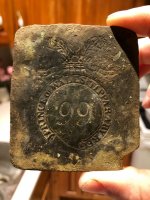coinking
Jr. Member
Hi, folks! I'm a brand new member looking for cleaning tips on Roman, Greek and Byzantine coins that have been buried for centuries. Lots of "clad" on them, and have tried lemon oil and salt water, coarse grit tumbling, olive oil, hot glue and so forth. (Was going to take a shot at the potato trick too.) A few are starting to look presentable, but most still have a thick layer on top. Would welcome any tips you can supply, and thank you in advance for your assistance!








